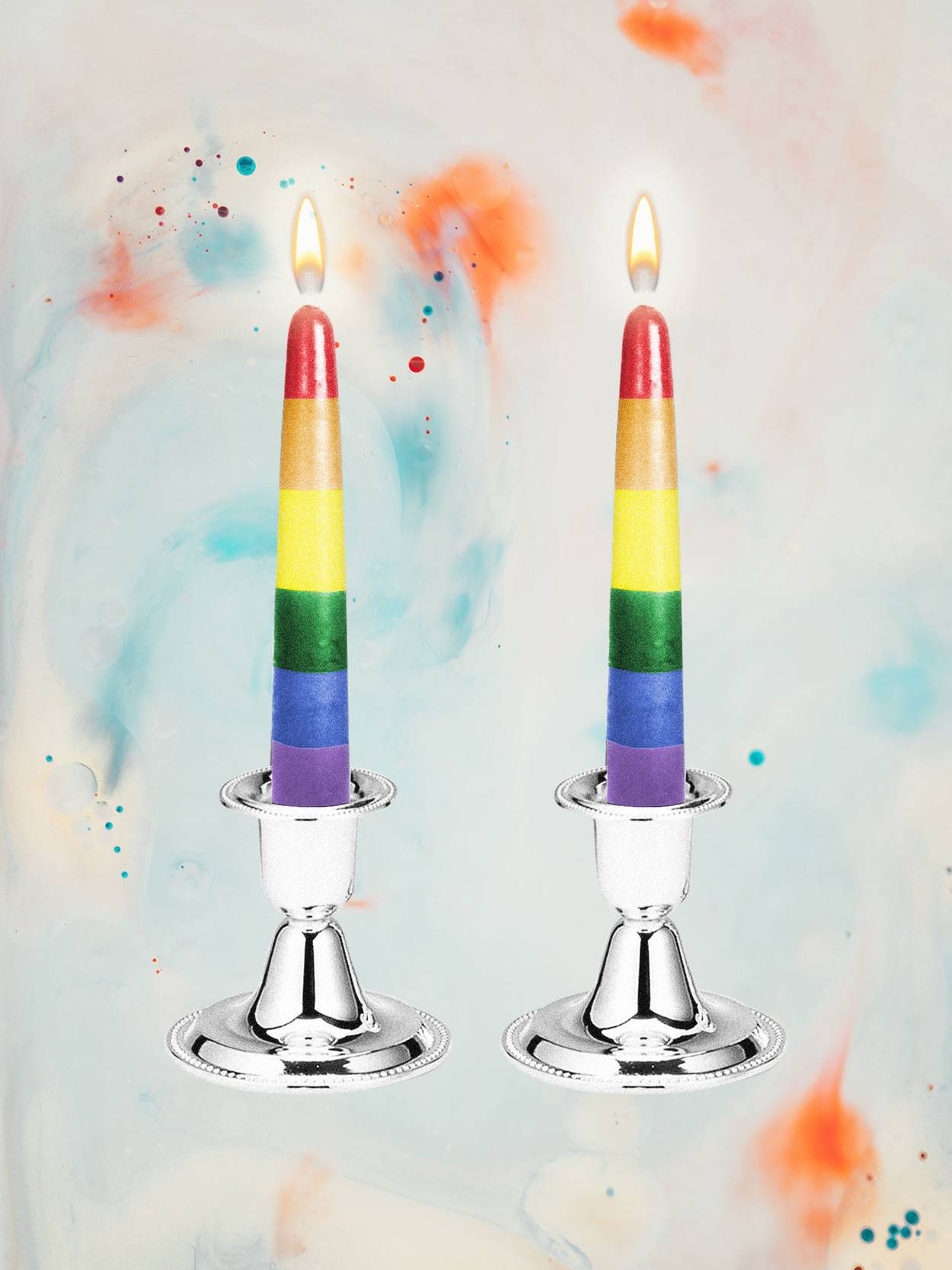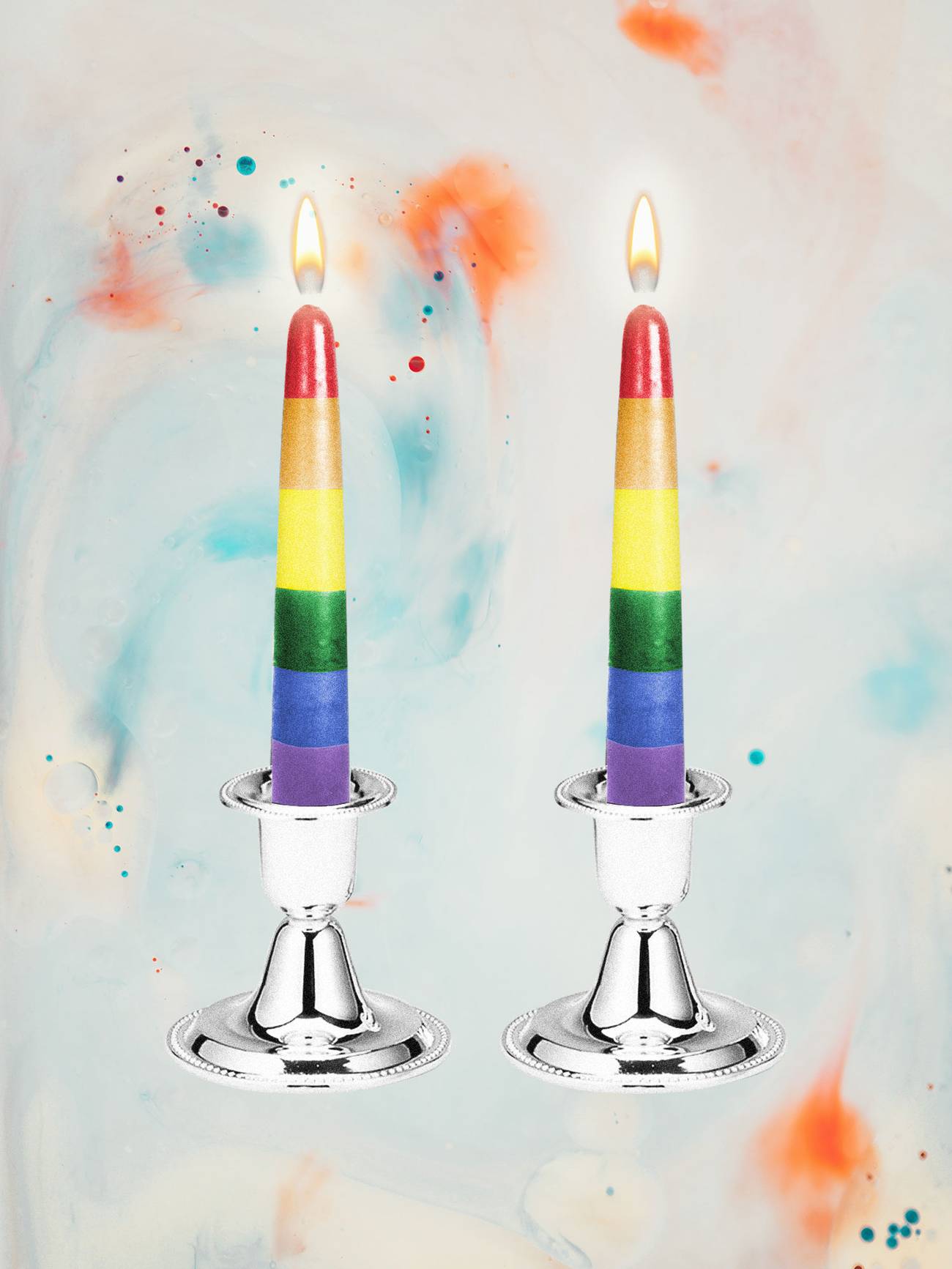Building Community Over Friday Night Dinner
In Jerusalem, Shabbat Shelach maintains a focus on both queer identity and religious practice




Nicole Kaufman Grubner wasn’t publicly out as a lesbian in her hometown of Vancouver, but after she made aliyah in 2013, she began to share her identity more widely. She started looking for a community in Israel where she could meet other people like herself.
She was thrilled to find Shabbat Shelach, a group that aims to build community for lesbian, bisexual, and transgender women—around the Shabbat table.
Shabbat Shelach was founded in 2016 by two Americans, Sarah Weil and Ariel Hendelman. “We had nowhere to go,” said Weil. “The religious Jewish world accepted our Judaism but rejected us as gay. And the gay world accepted our gayness but rejected our Jewish values. We were stranded between worlds and so we created a new space, where we could live authentic Jewish lives as gay women. For me, Shabbat Shelach became my supportive community for living a Torah-centred, God-centred life and building a real future as a gay Jewish woman.”
At least once a month, the group hosts potluck Shabbat dinners in Jerusalem in private homes, where Jewish women from around the country attend. On average around 10 women attend each Shabbat meal, but if the host has capacity, it can be larger.
When the group was founded, it occupied a niche space.
“There are a lot of LGBTQI+ groups that focus exclusively on queer identity, and often people with a religious identity have to pick one identity over the other,” said Kaufman Grubner, who has been a member since 2016. “Shabbat Shelach was founded to say we want to have both parts of our identities and that is why the organization is centered around the Shabbat table.”
The group differentiates itself from other lesbian support groups in Israel, such as Bat Kol, because most of Shabbat Shelach’s members are English-speaking olim who come from religious or spiritually inclined backgrounds. While the group does not specifically identify as Orthodox, many of its members—including Kaufman Grubner—are from observant or spiritually inclined homes and have an affinity and deep familiarity with religious practices.
“I wouldn’t say the group is Orthodox. I would say that we are religiously oriented,” said Kaufman Grubner. “We have members who live in fully ultra-Orthodox cities, who are not out, and they come to Shabbat Shelach. We have members who are atheist who are connecting around Shabbat. All the meals we put on are kosher and the food must be prepared in a kosher kitchen. We want everyone to feel that comfort.”
From this simple premise, the group, which numbers close to 200 members, created a lesbian support community that many were seeking. Its members include Americans, Canadians, Australians, New Zealanders, and Europeans. A few Israelis have also joined their programs. Members range in age from their early 20s to their 60s.
We are proud of who we are, we are Jewish and queer. We are different. We are two minorities.
“Shabbat is really the epitome of this idea of welcoming, gathering in, sharing food and Torah and stories, opening our homes to each other,” said Hendelman. “In Shabbat we found the secret to community. It fills me with so much joy and pride that now, seven years later, Shabbat Shelach is still going strong with a community of over 200 women and female-identified folks. Its such a blessing and shows how much it was needed.”
Because the group was originally formed for English-speaking olim, it continues to cater to that crowd in Israel. “If you can connect in English, come and join us. It is a welcoming group,” said Kaufman Grubner. “Even if your English is broken, we can find a way to communicate. We want everyone to feel welcome. We err on the side of inclusion.”
While the majority of members are lesbians, the group includes members who don’t identify as lesbians but are gender nonbinary or transwomen.
“We are women-aligned,” said Kaufman Grubner. “If you identify as a woman and are assigned female at birth, or you are gender queer, you can attend.”
Prior to the COVID-19 pandemic, the group was gaining momentum around its programs and a growing number of women who were excited to find their niche in the active LGBQTI+ scene in Israel. In addition to regular Shabbat meals, the group hosted a Passover Seder with a grant from the Schusterman Foundation and hosted a Shabbat dinner for the wider community at the Shalom Hartman Institute.
The pandemic slowed down its offerings, but the group continues to serve up a range of programs to members.
“There is a need for this type of connection and community, and I see it as part of my religious service,” said Kaufman Grubner. “To have a space that is religiously Jewish and not to feel any shame to participate in it with our full selves. It’s really important we have these spaces available in Israel.”
Among the members of Shabbat Shelach there are women who are not yet out to their families and friends in religious communities.
For Tova F., who asked that her last name not be used because she is not out to her grandparents, Shabbat Shelach provided a welcome to a community that she had not previously realized she was a part of. Growing up in New York in a modern Orthodox family, she went to an all-girls school and, growing up, she noted, “we definitely weren’t talking about LGBTQI rights in my home or school.”
When she made aliyah from New York, Tova wanted to find community: “In Israel I was more open, in Israel I was experimenting with coming out. I realized that I needed people. I grew up without role models” in the LGBTQI+ community.
The first time Tova came to Shabbat Shelach, she felt that she had found a place where she could really belong.
“Seeing queer women sitting around a Shabbat table, these are my role models,” she said. “They show me what will it look like when I am married and starting a family. Among them are women that cover their hair and women that do not. There are ex-Haredi women. It is every possible denomination. The commonality is people who want to experience Shabbat or experience the meal.”
Shabbat Shelach attracts women who are looking for a familiar religious experience while being proud of their queerness, and this provides an unexpected side benefit for all attendees: matchmaking.
In just over six years of operations, it is estimated 10 couples have met through Shabbat Shelach.
Naavah Vesley, a 25-year-old who made aliyah from New York, met her partner, Jules, through the group. While these days, the two of them and their baby live in Sydney, Australia, they owe their partnering to Shabbat Shelach.
“At Shabbat Shelach we have a pretty good shidduch rate,” said Vesley, using the Yiddish term for matchmaking. “It is one of the most beautiful communities I have ever been part of. We are proud of who we are, we are Jewish and queer. We are different. We are two minorities.”
Prior to joining Shabbat Shelach, Vesley had been searching for a community where she belonged.
“Before I moved to Israel [in 2018] I came to terms with the fact I’m a lesbian. A religious lesbian. I grew up in a closed religious Orthodox community in New York. I did not know what a lesbian was until I was 16,” she said. “I made friends in Shabbat Shelach that I never thought I would make.”
Despite moving to Australia to be closer to her partner’s family now that they have a baby, Vesley is grateful for all the good times she had with the group. “Shabbat Shelach gave me family when I did not feel like I had any,” she said. “It gave me a sense of purpose and meaning. Being able to give back to a community. A community I felt was lacking in New York for what I needed and it gave me confidence to be what I am.”
In June, to celebrate pride month, the group is planning a Parsha and Pride paint night where participants will combine Torah study and self-introspection through art and painting.
“When we started Shabbat Shelach, we were looking to fill a need, especially among anglo LGBTQI+ women, for connection and community,” said Kaufman Grubner. “Today we have that community … but we also attend each other’s weddings, get together for meals, meet at the park to play basketball. Shabbat Shelach has created a space to meet friends, meet potential partners, and connect over shared values.”
Nomi Kaltmann is Tablet magazine’s Australian correspondent. Follow her on Twitter @NomiKal.